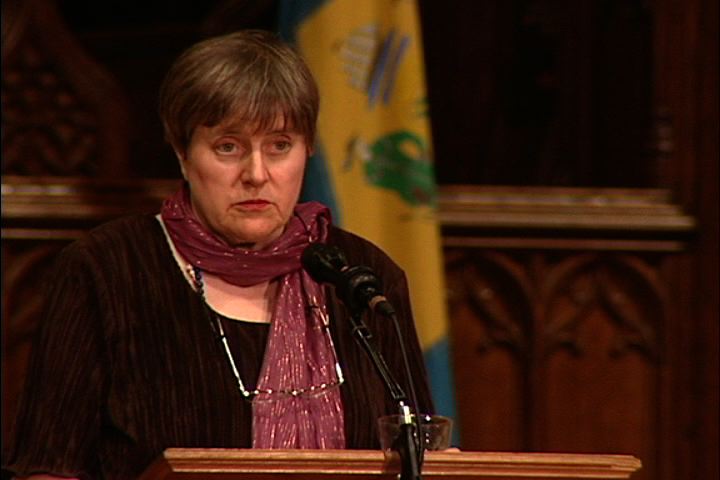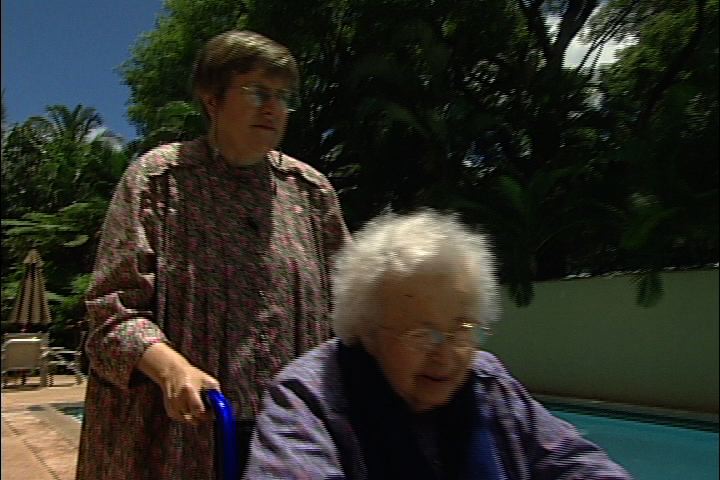In This Episode << SLIDE LEFT TO SEE ADDITIONAL SEGMENTS
Kathleen Norris
BOB ABERNETHY, anchor: We have a profile today of the poet and writer Kathleen Norris, whose books have won her many admirers, especially among religious believers. After nearly 10 years of literary silence she has a new book out called “Acedia and Me.” Acedia, Norris says, is a kind of spiritual gloom that she has endured on and off since she was 15.
KATHLEEN NORRIS (Author and Poet): It’s an ancient word that basically means the inability to care, even to the extent that you can’t care that you don’t care anymore. It’s sort of a really drastic, nasty form of indifference.
ABERNETHY: Norris first became popular in the ’90s with a story about her life on the Great Plains, to which she and her husband had moved from New York City. The book was called “Dakota.” In the Dakotas, and then at St. John’s Abbey in Minnesota, Norris discovered Benedictine monasteries and the ancient practice of chanting the psalms five times a day. She wrote about monastic life in “The Cloister Walk.” Next, in “Amazing Grace,” Norris offered her thoughts on Christian language, and in “The Virgin of Bennington” she wrote primarily about poetry.
And then, nothing more. The books stopped coming. What happened was that Norris had to become a full-time caregiver — now, to her 91-year-old mother in Hawaii, where Norris grew up. Earlier, it was her father who needed care, and her sister, and especially her husband David, who suffered severe mental and physical illness for many years until his death from cancer in 2003.
Ms. NORRIS: The last 10 years, I would say, have been really rough, and in some senses this book is a miracle to me because I was able to finish it at all. There were so many temptations, especially after my husband died, to just give up and say, “Why write at all? Why bother?” Which is — the ultimate question with acedia is “Why bother? Why care? Why do anything?” All thought of writing was sort of shoved to the side for me.
ABERNETHY: Norris thinks acedia is different from depression.
Ms. NORRIS: If I’m depressed I tend to know the reasons why. With acedia there is no cause. It just sort of pops up, and I might wake up in the morning thinking, “Oh, this is going to be a good day,” and then all of a sudden the thought, “No, it won’t be,” and maybe I shouldn’t get out of bed.
ABERNETHY: Slowly, eventually, Norris managed to get back to her book. On the day it was finally published, she was at the Washington National Cathedral recalling how hard the process had been.
Ms. NORRIS (speaking at Washington National Cathedral): Coming back to the project always felt like climbing a mountain in a raging hailstorm. On more days than I care to recall, I would settle for reading thrillers or even watching “America’s Next Top Model” marathons.
ABERNETHY: Norris had learned from the Benedictines that one way to combat the indifference of acedia was praying the psalms. Other remedies were physical work, exercise, and baking bread. Perhaps most important for her was accepting her family responsibilities.
Ms. NORRIS: One of the reasons I decided that I’d better not have children is because I really didn’t want to be a caregiver. So it is something that has been imposed on me, and I have really had to learn how to cope with that, how to be patient and loving instead of irritable and impatient and, believe me, it is a struggle, and I don’t always make it. To think, if I’m with this person, helping them do this ordinary task, like going to the bathroom, that’s the most important thing I can be doing with my life at the moment — to convince myself of that every day.
ABERNETHY: One thing that made Norris want to get the book finished and published was her sense that acedia might be a problem for the whole country.
Ms. NORRIS: I realized that acedia was not just a personal problem, but really it’s one that we suffer as a society. I think we often adopt that attitude of indifference because we’re being asked to care about so much. We just are exhausted.
ABERNETHY: Ever since she was a schoolgirl, Norris found refuge at Hawaii’s main public library, from which she borrows and returns books by the bagful. Meanwhile, she says she’s also learned a lot from taking care of others.
Ms. NORRIS: A friend asked me after my husband died, “Well, have you lost your faith?” And my gut reaction, my instant response was to say “Of course not.” I mean, people die. This is what happens. That’s not God out to get me. That’s just a fact of life is that people die. So it really — it didn’t shake my faith, really. It made me feel just more like everyone else in the universe. You know, people you love are going to suffer and die, and you somehow have to learn how to cope with that.
ABERNETHY: Norris says the opposite of acedia, and its most powerful antidote, is love.
Ms. NORRIS: I think part of the struggle just of everyday life is remembering that the love is there. It’s just, it’s a constant. And to wake up in the morning and realize that love is there in the world, it’s there in your relationships — if I can do that, that’s half the battle.
ABERNETHY: In Honolulu, Norris continues to take care of her mother. She says acedia remains a part of her, something she just has to live with. She would like to write more poems, she says, or in a perfect world she would follow a book on acedia with a comic novel. But she knows very well that the world is not perfect.





